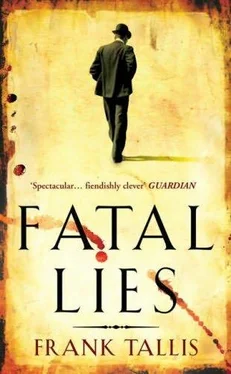Frank Tallis - Fatal Lies
Здесь есть возможность читать онлайн «Frank Tallis - Fatal Lies» весь текст электронной книги совершенно бесплатно (целиком полную версию без сокращений). В некоторых случаях можно слушать аудио, скачать через торрент в формате fb2 и присутствует краткое содержание. Жанр: Исторический детектив, на английском языке. Описание произведения, (предисловие) а так же отзывы посетителей доступны на портале библиотеки ЛибКат.
- Название:Fatal Lies
- Автор:
- Жанр:
- Год:неизвестен
- ISBN:нет данных
- Рейтинг книги:3 / 5. Голосов: 1
-
Избранное:Добавить в избранное
- Отзывы:
-
Ваша оценка:
- 60
- 1
- 2
- 3
- 4
- 5
Fatal Lies: краткое содержание, описание и аннотация
Предлагаем к чтению аннотацию, описание, краткое содержание или предисловие (зависит от того, что написал сам автор книги «Fatal Lies»). Если вы не нашли необходимую информацию о книге — напишите в комментариях, мы постараемся отыскать её.
Fatal Lies — читать онлайн бесплатно полную книгу (весь текст) целиком
Ниже представлен текст книги, разбитый по страницам. Система сохранения места последней прочитанной страницы, позволяет с удобством читать онлайн бесплатно книгу «Fatal Lies», без необходимости каждый раз заново искать на чём Вы остановились. Поставьте закладку, и сможете в любой момент перейти на страницу, на которой закончили чтение.
Интервал:
Закладка:
“Why?”
“Why?” repeated the headmaster. “Why?” His voice suddenly changed, climbing in pitch and volume. “What was I supposed to do? Leave him in the laboratory?” His rhetorical sarcasm revealed years of experience in the classroom. He glanced at his deputy, and something passed between them. When the headmaster resumed, his voice was more steady. “I feared the worst, but was reluctant to pronounce the boy dead. I am not a medical man, Inspector. I thought it best to get him to the infirmary and send for Nurse Funke; however, as I suspected, she could do nothing for him.”
Rheinhardt automatically reached for his notebook but then, suddenly remembering that he was wearing his tails, allowed his hand to drop. The headmaster's expression declared-quite clearly-that he believed Rheinhardt was an idiot. The inspector took a deep breath and continued his questioning.
“And after sending for Nurse Funke?”
“I telephoned Dr. Kessler and the police. Some constables arrived within the hour. They are still here-one is standing outside the infirmary; the other is in the laboratory. I have no idea where Kessler is!”
“Kessler is the school doctor?”
“Yes.”
“Where did he set off from, do you know?”
“His apartment in the sixteenth district.”
“The main road above Aufkirchen is impassable-a fallen tree, apparently. He may have been delayed, as we were.”
The headmaster tutted, almost as if Rheinhardt were a schoolboy presenting a weak excuse for not having completed his homework.
“The infirmary is upstairs, Inspector,” said the headmaster. He then walked off at a brisk pace, calling back, “This way.”
Rheinhardt and Haussmann followed the headmaster and his deputy down an adjoining corridor. They began ascending a narrow staircase. When Rheinhardt caught up with the headmaster, Eichmann proceeded to give an account of the evening's events.
“The deputy headmaster and I were in my office. We had barely begun our meeting when Professor Gartner appeared at the door. He was evidently distressed. He had seen a light on in the laboratory and had entered, expecting to find the deputy headmaster.”
“Science is my discipline,” Becker interjected.
“Gartner,” the headmaster continued, “had found the boy, Zelenka, slumped over a workbench.”
“At what time?”
“It must have been…” The headmaster glanced at his deputy for confirmation. “Just before seven?”
Becker agreed.
“What was Zelenka doing in the laboratory?” asked Rheinhardt.
“An assignment,” said Becker.
“Which, presumably, you had set him?”
“Yes,” Becker replied. “A simple inquiry into the effects of vinegar on certain compounds.”
Rheinhardt studied Becker more carefully. He was Eichmann's junior by a decade or so. His hair was relatively long, but receding, which had the effect of increasing the salience of his high, domed forehead. This feature, taken together with his perceptive eyes and gold-rimmed spectacles, conveyed a strong impression of superior intellectual endowment. His mustache was stiff and straight, projecting outward beyond his jawline, and his thick beard was unusually styled, the tip having been clipped to achieve a forked extremity.
“Why was he doing this assignment on his own? Was he being punished?”
“No,” said Becker, “not at all. Zelenka was one of our keener students. He was always requesting additional work.”
“The deputy headmaster and I…” Eichmann resumed his story with renewed firmness of purpose, and his raised voice suggested he was a little piqued that Rheinhardt s attention had shifted to his junior. “The deputy headmaster and I hurried down to the laboratory, accompanied by Professor Gartner. We tried to rouse the boy… but our ministrations had no effect. I returned to my office and made the telephone calls I referred to earlier, to the police and Herr Dr. Kessler. The deputy headmaster went to get Nurse Funke-she lives in one of the lodges.”
“The lodges?”
“Accommodation for the staff: built on our grounds and mostly occupied by masters. Nurse Funke has rooms in the building nearest the school.”
“And what did Professor Gartner do?”
“He organized the transfer of Zelenka from the laboratory to the infirmary with the help of Albert and two prefects.”
The mention of prefects made Rheinhardt ask: “Where are the boys? I haven't seen one of them.”
“Asleep, of course,” said the headmaster. “In the dormitories. They have to get up early for drill.”
“And Professor Gartner? Where is he?”
“I believe he is resting in the common room. I suggested he retire there with a brandy. He was very upset.”
As they ascended the staircase, Rheinhardt noticed that the walls were very bare: blank expanses of grubby whitewash, no regimental photographs, trophies, or flags-in fact, nothing to please the eye. He also noticed the smell. A musty institutional smell-redolent of boiled vegetables, poor ventilation, and latrines. It was a smell that permeated virtually all official buildings in Austria, and had attracted its own special appellation: the “treasury” smell. It was one that had followed Rheinhardt throughout his life. Sometimes, even outside on a cold, clear day, he could smell that distinctive cloying odor in his nostrils.
They arrived at the top floor and the infirmary. A constable was standing outside.
“Security office?” asked the constable.
“Yes, yes,” said the inspector, now becoming rather irritated by the effect of his clothes. “Detective Inspector Oskar Rheinhardt- and my assistant, Haussmann. You will kindly open the door, please.”
The constable, detecting both tetchiness and authority in Rheinhardt s voice, clicked his heels and meekly did as he was told.
Rheinhardt entered a stark, featureless room, painted over in the same monotonous whitewash. The ceiling was low, and four beds occupied most of the space. A tin sink was fixed to the wall, into which a dripping tap was reproducing the rataplan of a snare drum. On one of the beds was the body of the boy, Zelenka. A sheet had been thrown over him.
Sitting at a small desk, next to the door, was a middle-aged woman in a nurse's uniform. She stood up as the men entered. The headmaster thanked her for waiting, and introduced Rheinhardt and his assistant. She then went to the nearest bed and gently pulled at the cover. It slipped away, revealing the face of a young boy.
“Thomas Zelenka,” said the nurse.
“How old was he?”
“Fifteen.”
“I see.”
As far as Rheinhardt could make out, the boy was of medium build. He had a handsome, stoic face: a square chin and full, sensuous lips. His light brown hair-which originally must have been closely cropped-had grown out a little, producing a covering of dense bristles.
“What happened?” Rheinhardt asked, puzzled.
“I don't know,” said the nurse, shaking her head. “He was already dead when I arrived. I tried to resuscitate him-but there was little point in trying.”
“And the cause of death?”
“I am afraid you will have to ask Dr. Kessler when he arrives. I have no idea.”
Rheinhardt leaned forward and examined Zelenka's head. As he did so, he registered a light dappling of juvenile freckles on the boy's cheeks.
“No bleeding? No signs of the boy having been struck?”
“No,” said the nurse, sounding a sudden note of surprise.
Rheinhardt looked into her eyes. They were gray and watery.
“Did you know the boy?” he asked.
“Yes,” Nurse Funke replied. “I knew Thomas Zelenka very well.” She blinked a tear from her eye. “He was always catching colds… I used to give him a balsam inhalation to help him breathe.”
Читать дальшеИнтервал:
Закладка:
Похожие книги на «Fatal Lies»
Представляем Вашему вниманию похожие книги на «Fatal Lies» списком для выбора. Мы отобрали схожую по названию и смыслу литературу в надежде предоставить читателям больше вариантов отыскать новые, интересные, ещё непрочитанные произведения.
Обсуждение, отзывы о книге «Fatal Lies» и просто собственные мнения читателей. Оставьте ваши комментарии, напишите, что Вы думаете о произведении, его смысле или главных героях. Укажите что конкретно понравилось, а что нет, и почему Вы так считаете.












